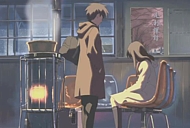
Five Centimeters Per Second
In a recent column, I gave a little bit of grief to one of my favorite anime directors, Satoshi Kon, over his film Paprika. It's a great film and one I would recommend you see. However, as I said in my review, "Kon has gone to the same well too many times." Most of Kon's films have turned out to be about the line between reality and fantasy, in some way or another. They are all pretty great, but with Paprika, I just felt like maybe he wasn't streching himself.
You came to this review, perhaps obviously, to read about Five Centimeters Per Second, the new film by Makoto Shinkai, and not about Satoshi Kon and Paprika. But there are surprising parallels between Kon and Shinkai. Both have directed films that have been rightfully praised as the best of the new generation of anime. Both have the talent to write their own material. And both have a penchant for telling stories with a similar basic core concept. Whereas Kon is compelled by exploring the realm where dreams meet the real world, each of Shinkai's tales is grounded in longing, nostalgia, and melancholy -- what the Japanese call, in a single word, natsukashii.
This truth would make it easy to say the same thing about Five Centimeters Per Second that I did about Paprika, that it doesn't cover enough new ground. Indeed, one cannot watch Voices of a Distant Star or The Place Promised In Our Early Days, Shinkai's earlier works, and not get many of the same feelings. However, this time Shinkai is walking the tightrope without a net, and while his earlier shows were fabulous, Five Centimeters is his most mature work that uses his previous features as a stepping stone. This is not a retread but a culmination, one that takes some bigger risks and soars even higher as a result. Simply put, this cements Makoto Shinkai as my favorite anime director working today.
The film is told in three vignettes that feature the same central character, Takaki, but his role changes in each. The first story, "Cherry Blossom," involves his relationship with childhood friend Akari. She and he were best friends at one time, but due to moving families and shifting schools, they can only communicate through the mail. Takaki longs to see her and eventually sets up a long train journey to meet her...but a burgeoning snowstorm may keep him from ever meeting up again with his long-lost love. The second story, "Cosmonaut," moves us forward in time and is told from the perspective of Kanae, a sweet surfer who has fallen for the kind but vaguely distant Takaki. Her own life seems to be on hold until she can finally figure out how to deal with her blossoming feelings. Finally, the third tale, "Five Centimeters Per Second," moves us into the present day. As he sees a girl that resembles Akari crossing a train track, Takaki attempts to come to grips with a whirlwind of emotions about his past loves and future possibilities.
So what's exciting about that? Nothing in particular...and that's the point. In his previous work, Shinkai has always had some sort of science-fiction "hook." This film abandons those angles entirely, and it doesn't replace them with giggly girls or hot springs or overconfident alpha males. Shinkai has taken a dramatic leap in his storytelling by allowing the character interactions to happen in the real world between people who could very well be living next door, without requiring mecha or plot machinations. Without a story-driven narrative, Shinkai has created something more akin to David Gordon Green's All The Real Girls or Sofia Coppola's The Suicide Diaries, and it is certainly an emotional cousin to Ghibli productions Only Yesterday and Whisper of the Heart. I mean, except for a few brief dreamscape moments, this film could have been a live-action film made on a shoestring budget and sold at Sundance. Now if the realm of independent film scares you and you can't handle movies that aren't under 100 decibels, then you might as well stop reading. But what I love about this movie is that it's an anime is so willing to not be anime...at least not anime as usual.
Shinkai's controversial ending to the feature proves both his skills and his chutzpah. Without spoiling anything, most people won't like it because it's quite unconventional. On top of that, Shinkai uses a very popular Japanese song from ten years ago to establish the mood of the final vignette, which is something the rest of the world may not appreciate. Right now, it seems that most anime are being created for the international market; there is not a whole lot about them that seems truly Japanese any more. In comparison, this film feels both universal and Japanese at the same time, and it reminds me of why I got into anime so long ago. And as far as the ending goes, you either hate it or you get swept up in it. You can tell which direction I went.
What is truly a shame, at least right now in August 2008, is that the disc is out of print. ADV Films released it in March of this year, but it was hard to find from the beginning, and their financial woes seem to have made the disc nigh impossible to locate right up through the moment they declared it off the market. What's more, unlike many of ADV's other titles, this one hasn't been picked up by anyone else. It's probably because something of this caliber -- and, to be truthful, this off the proverbial beaten path -- is hard to sell to the teenagers and twentysomethings that make up a large amount of the market. But that's really too bad, because thoughtful people in this age bracket would certainly find this film a worthy experience. When a show this existentially beautiful can't find a distributor, something's wrong in the world.
I'm not going to say that Five Centimeters Per Second is going to be in my DVD player every week. It's not action-packed, exciting, or funny. The emotions it raises in me are not ones I want to explore on a daily basis. But I feel I come out of watching Makoto Shinkai's films a little bit of a better person for them; I am engaged and deeply moved by them. It's an experience you're rarely going to find in a movie, and I cannot encourage you strongly enough to witness it for yourself.
Five Centimeters Per Second -- nothing objectionable -- A+

